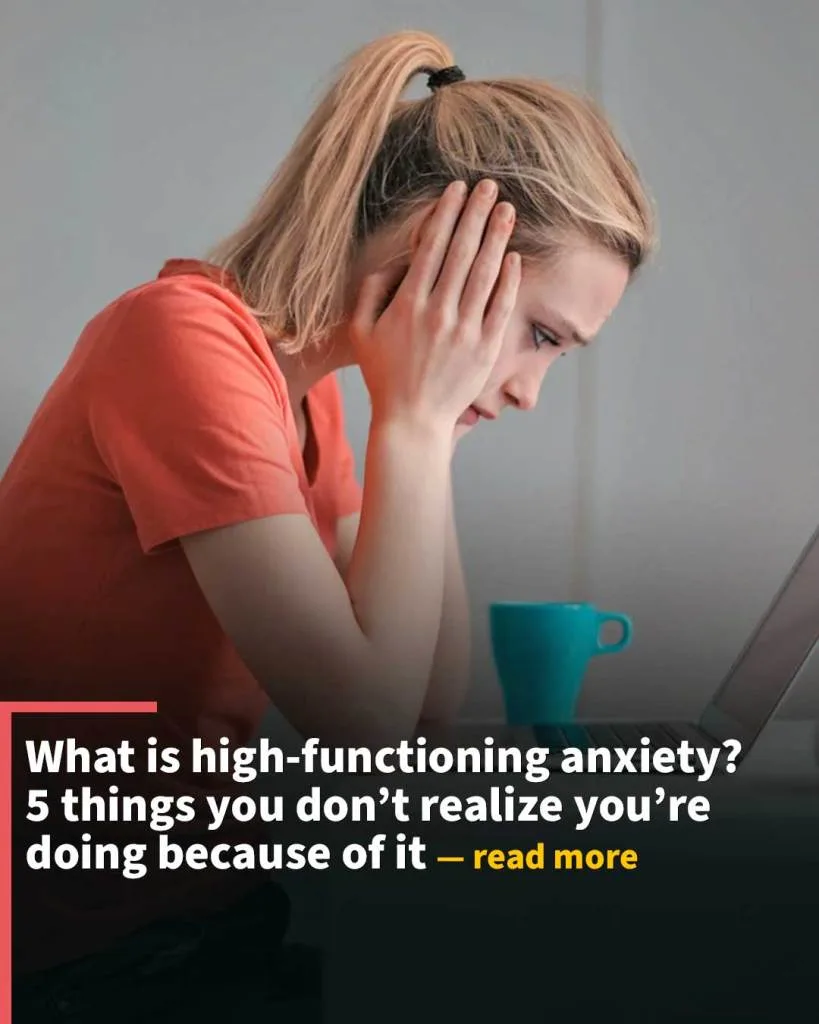A TikTok video went viral earlier this year, where an anxiety therapist shed light on high-functioning anxiety. But what exactly is it?
To understand this disorder, it’s helpful to first know what anxiety is.
Anxiety is about worrying about the future, which can make your muscles tense and lead you to avoid things that make you anxious, according to American Psychiatric Association.
It’s normal to feel anxious when stressed, and sometimes, a bit of anxiety can be useful, keeping us alert and focused.
However, when anxiety becomes overwhelming and develops into a disorder, it can be challenging.
Anxiety disorders, which affect almost 30% of adults, involve excessive fear and anxiety that are hard to manage.
The positive news is that anxiety disorders can be treated with various therapies, helping individuals return to their normal lives and stay productive.
What is high-functioning anxiety?
High-functioning anxiety, a type of generalized anxiety disorder, can be hard to spot.
It happens when people have anxiety symptoms but keep pushing themselves forward instead of backing away from challenges, according to Verywell Mind.
They often seem very successful, especially if success is measured by what they achieve.
But behind their seemingly flawless exterior, they’re constantly dealing with anxiety that others might not see.
Individuals with high-functioning anxiety differ from others with anxiety in their ability to manage daily life independently, as stated by Dr. Asim Shah of Baylor College of Medicine, per Psycom.
They excel at handling routine tasks without requiring much assistance.
Dr. Shah added that these individuals show symptoms akin to generalized anxiety disorder but can conceal them, allowing them to function effectively throughout the day.
Their notable difference lies in their heightened functionality.
What does the TikTok video say?
According to the video titled “5 Things You Don’t Realize You’re Doing Because of Your High-Functioning Anxiety,” posted by Anxiety Therapist Sarah Chernick, you are doing the following things if you have this kind of anxiety:
- You are nice and easy to be around, but you people please too much.
- You obsess over trivial things that other people probably didn’t notice.
- You are consumed by every mistake you make by beating yourself up over it.
- You know you are capable, but you don’t fully believe in yourself.
- In every situation, the worst scenario is your biggest thought.
Licensed professional counselor Tatiana Garcia warned that the behaviors mentioned in the viral video may be seen in individuals with anxiety disorders.
However, she said that there are no definitive signs of such disorders, as per Newsweek.
“I do believe it is under-recognized because individuals with high-functioning anxiety tend to put a lot of pressure on themselves and have difficulty asking for help,” Garcia said, adding that the situation makes it difficult to recognize their struggles, especially when they strongly identify with their accomplishments and efficiency.
What causes high-functioning anxiety?
Experts think that anxiety comes from both your family history and things that happen around you. Some reasons for this could be:
- Family history
- Going through tough or upsetting times
- Having health issues like problems with your thyroid
- To much alcohol and drugs
- Feeling shy or nervous a lot when you were younger
Some people who do well in their jobs quickly, like doctors with a lot of patients or lawyers who become partners fast, might be more likely to have high-functioning anxiety, explains Sasha Hamdani, M.D., a psychiatrist at the Psychiatry Associates of Kansas City, Kansas, Forbes Health noted.
These reasons can change from person to person. Just because you’ve had one of these things happen to you doesn’t mean you have anxiety.
Signs that a person is suffering from high-functioning anxiety
Here are some signs of high-functioning anxiety, according to Bach and Garcia:
- Excessive worry
- Worrying about the worst-case scenario
- Overthinking
- Perfectionism
- Physical manifestations (such as tension headaches, muscle tension, digestive problems)
- Having difficulty relaxing
- Appearing calm and hardworking externally
- Having a strong fear of failure internally
- Overworking
- Putting excessive pressure on yourself
- Having difficulty saying “no.”
- Feeling overwhelmed as a result of all of the above
Garcia also outlines subtle signs of high-functioning anxiety:
Excessive planning through to-do lists or constant checking of calendars is seen as a coping mechanism for fear of uncertainty.
Adhering strictly to routines due to a fear of deviation, causing frustration and irritability when disrupted.
Frequent self-comparison despite external confidence leads to self-doubt and worry about meeting high standards.
How to manage anxiety?
Anxiety often reveals positive traits like empathy and determination.
Individuals with anxiety are often caring, conscientious, and committed to their communities.
They need to build self-confidence and acceptance by identifying their core values and setting meaningful goals.
Therapy, especially cognitive behavioral therapy (CBT), helps reframe negative thoughts and behaviors, empowering individuals to navigate anxiety with resilience.
Seeking help is a proactive step, not a sign of weakness, demonstrating intelligence and humility, Mayo Clinic noted.
Embracing anxiety as a natural response fosters self-compassion and resilience, affirming that it doesn’t define one’s worth.
Gradually, individuals can develop a balanced perspective, recognizing anxiety as just one aspect of their identity, with the strength to manage it effectively.
Here are some ways to cope with anxiety, along with therapy:
- Stop comparing yourself to others: People with anxiety often compare themselves to others, which can steal their happiness.
- Find your own rhythm: Everyone has different needs and energy levels. Some people like being busy all the time, while others need breaks. Find a balance that feels right for you.
- Build a support system: People with anxiety may think they have to deal with it alone because they fear criticism. Having supportive friends and family can help ease anxiety.
- Figure out what matters to you: Sometimes, people with anxiety focus too much on what society says is important, like having the right job or possessions. A therapist can help you figure out what truly matters to you.
- Practice mindfulness: This means focusing on the present moment, which can help you feel calmer.
- Set boundaries: Know your limits and say “no” when needed. It’s okay to push yourself out of your comfort zone sometimes, but taking care of yourself is also important.
- Learn to handle criticism: Criticism can be tough, especially for people with anxiety. A therapist can help you learn how to take feedback calmly.
Medications can also help some people with anxiety. Still, they should only be used along with other coping strategies and under the guidance of a doctor.
Moreover, it is always best to seek professional help.
Although high-functioning anxiety isn’t an official diagnosis, it’s a significant group of people who deal with anxiety while still functioning well in their daily lives.
They often struggle with self-doubt, fear of failure, and a need to be perfect and please others, which can greatly impact their lives.
Watch TODAY’s report about the signs and symptoms of high-functioning anxiety below:
Discover more from My Positive Outlooks
Subscribe to get the latest posts to your email.













Renee Hall
Saturday 30th of March 2024
Very good suggestions & tools to deal more effectively with anxiety. My faith in God helps me greatly too, on a daily basis. GOD'S GOT THIS! Is a huge comfort to me!
Friday 29th of March 2024
This is me